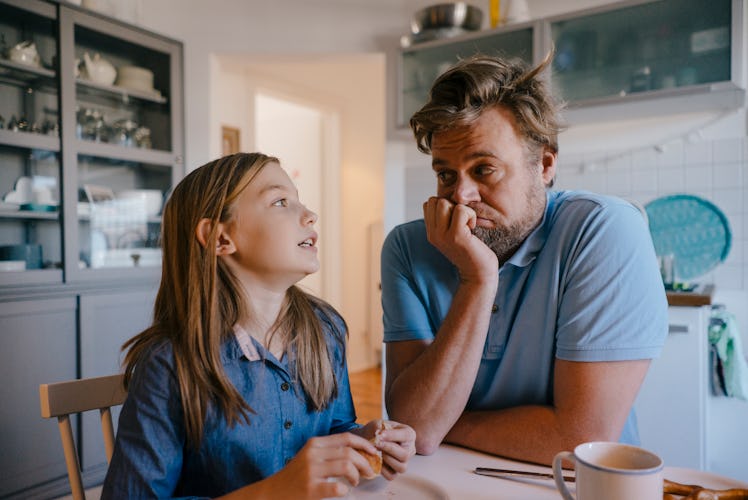Parents Don't Want To Helicopter Parent. They Do It Anyway.
A new survey shows that, while many parents claim to let their kids do things themselves, the reality is much different.

It turns out parents are much better at knowing the strategies that cultivate independence in kids than they are at practicing the strategies themselves. As much as moms and dads may want to veer away from the pitfalls of helicopter parenting, they just can’t stop themselves from hovering, new research has found.
According to a new poll from Mott Children’s Hospital at the University of Michigan, 74% of parents surveyed with kids between the ages of five and eight claimed to make it a point to have their child do things themselves when possible.
But when researchers dug deeper, they found a more interesting story. Just 30% of those parents report that they let their kids decide how to spend allowance or gift money, only 24% say their kids regularly order their food at restaurants or speak to unfamiliar adults in business situations, and only 20% have their kids prepare their own meals or snacks. In other words, while parents say they foster independence in their kids, they don’t really allow them to.
“There’s a sizable gap between parent attitudes about promoting children’s independence and what they actually allow or encourage their children to do without supervision,” Mott Poll co-director Sarah Clark, M.P.H. said in a release. “This suggests some parents may be missing opportunities to guide their children in tasks of autonomy and unintentionally hindering kids’ development of independence and problem-solving skills.”
Some of the reasons parents gave for constantly stepping in and doing things for their kids are understandable. Worrying about their child’s safety (44%) and feeling too crunched for time to let kids figure things out on their own (27%) were among the most common justifications, and, hey, fair enough.
But the nationally representative poll of 1,044 parents of children 5-11 years indicated that even as kids get older and are ostensibly more equipped for independence, parents still struggle to loosen the reigns. While four in five parents of children ages 9-11 saw the benefit of kids having free time without adult supervision, just three out of every five parents surveyed let their tween-aged child stay home alone for less than an hour. And less than half allow their child to walk or bike to a friend’s house or play at the park with a friend without adult supervision, with safety again cited as a primary concern.
“To some extent, worrying about your child is natural. But some parents are limiting their child’s independent activities due to highly publicized media reports, even if those outcomes are very unlikely to occur or cannot be prevented,” Clark said.
Granted, the examples cited in the poll aren’t the most troubling signs of helicopter parenting, like rushing to fix negative emotions, intervening in conflicts with peers, shielding kids from blame, and arguing with their teacher and coaches. Those are all helicopter parenting tactics that prevent kids from learning how to regulate their emotions and control their behavior. Studies suggest that kids who are constantly watched and overprotected in such a fashion are ill-prepared to cope with stress.
And, in the case of allowing kids to walk or bike to a friend’s house, some of these problems can be chalked up to hostile infrastructure. Many kids across the U.S. don’t live in bikable or walkable neighborhoods and parents fear their kids getting hit by a car — a not unreasonable fear, as car accidents are one of the leading causes of death for children.
However, allowing kids some of the proximity freedoms highlighted in the Mott Poll and allowing them to complete tasks independently is still important for raising self-sufficient kids. And that fostering of independence should start at a young age in developmentally appropriate ways.
“We as human beings are constantly looking for ways to collaborate and socialize with other people, but we're also striving toward self-actualization — figuring out what I can do for myself,” Lauren Starnes, Ed.D., Ph.D., Chief Academic Officer at The Goddard School previously told Fatherly. “We see the intensity of this desire in little kids who throw tantrums when they’re unable to act independently.”
One of the benefits of encouraging independence from a young age is that it allows parents to ramp up along with their kids so they don’t feel like they are letting go all at once. When the prospect of helping kids take the next step in their journey toward increased autonomy raises parental anxieties, Clark suggests setting everyone up for success with clear communication and finding opportunities for parents to let go of control in environments that take safety concerns into consideration.
“Parents can ease in with small steps such as letting their child spend time with a friend at a familiar public place,” she says. “Discussions before and after can help parents assess if their kids understand the importance of following safety rules.”